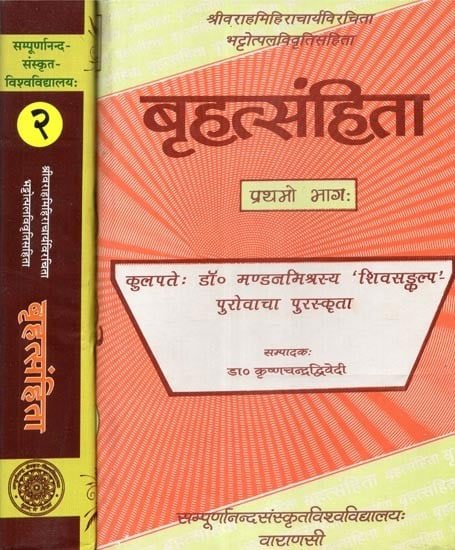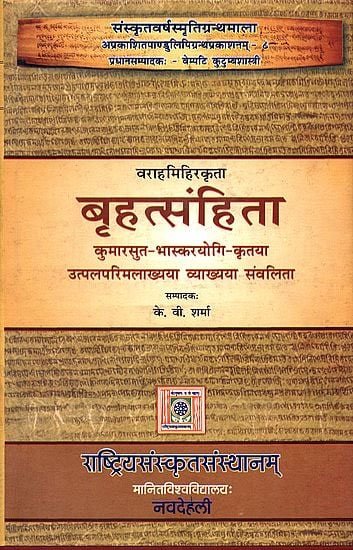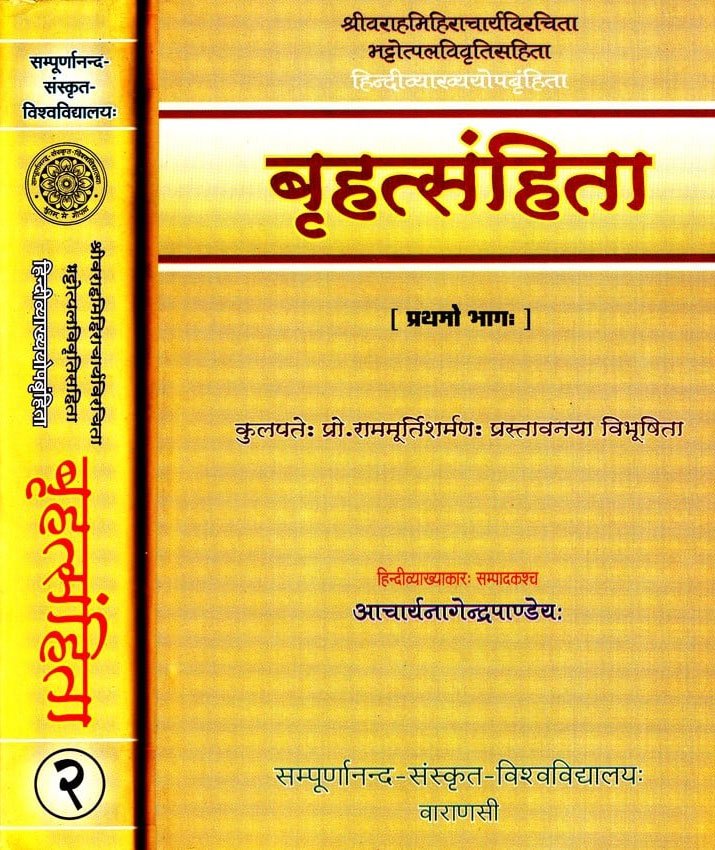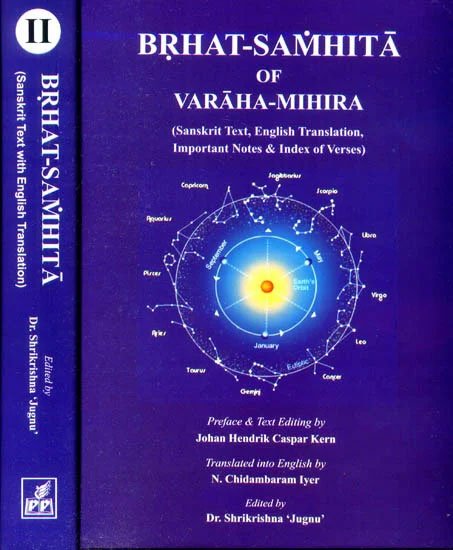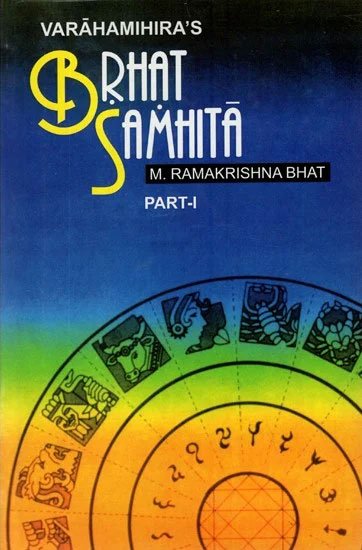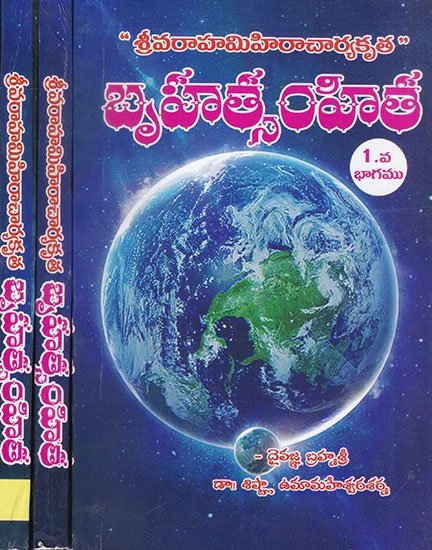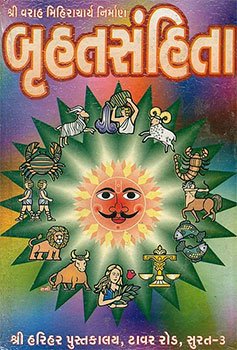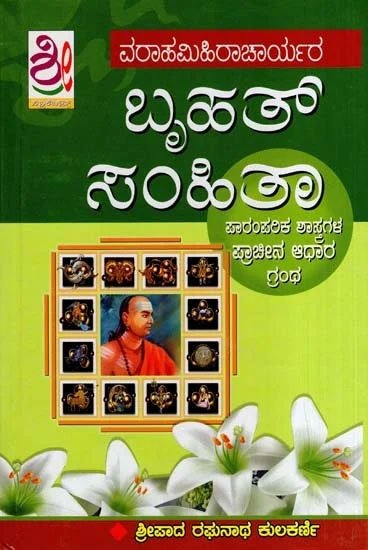Brihat-samhita [sanskrit]
26,560 words
The Sanskrit text of the Brihat-samhita from the 6th-century authored by Varaha Mihira in present-day Ujjain, India. It primarily deals with astrology and astronomy but is presented as an encyclopedia of knowledge.
Verse 22.2
तत्रैव स्वात्याद्ये वृष्टे भचतुष्टये क्रमात्मासाः ।
श्रावणपूर्वा ज्ञेयाः परिस्रुता धारणास्ताः स्युः ॥ २ ॥
tatraiva svātyādye vṛṣṭe bhacatuṣṭaye kramātmāsāḥ |
śrāvaṇapūrvā jñeyāḥ parisrutā dhāraṇāstāḥ syuḥ || 2 ||
The Sanskrit text of Verse 22.2 is contained in the book Brihata Samhita (Sanskrit Text with Hindi Translation) by Pandit Achyutananda Jha. This book is available online or you could buy the latest edition:
Read online Buy now! The Sanskrit text by Pandit Achyutananda Jha (2001)
Glossary of Sanskrit terms
Note: This extracts Sanskrit terms and links to English definitions from the glossary, based on an experimental segmentation of verse (22.2). Some terms could be superfluous while some might not be mentioned. Click on the word to show English definitions.
Tatraiva, Svati, Adya, Vrishte, Vrishta, Vrishti, Bha, Catushtaya, Kramat, Krama, Masa, Shravana, Purva, Jneya, Parisruta, Dharana, Tas,
Analysis of Sanskrit grammar
Note: this is an experimental feature and only shows the first possible analysis of the Sanskrit text (Verse 22.2). If the system was successful in segmenting the sentence, you will see of which words it is made up of, generally consisting of Nouns, Pronouns, Verbs, Participles and Indeclinables. Click on the link to show all possible derivations of the word.
- Line 1: “tatraiva svātyādye vṛṣṭe bhacatuṣṭaye kramātmāsāḥ ”
- tatraiva -
-
tatraiva (indeclinable adverb)[indeclinable adverb]
- svātyā -
-
svāti (noun, feminine)[compound], [adverb], [nominative dual], [vocative dual], [accusative dual], [instrumental single]svāti (noun, masculine)[compound], [adverb], [nominative dual], [vocative dual], [accusative dual]svātī (noun, masculine)[compound], [adverb], [nominative dual], [vocative single], [vocative dual], [accusative dual], [instrumental single]svātī (noun, feminine)[compound], [adverb], [nominative single], [vocative single], [instrumental single]svātī (noun, neuter)[compound], [adverb], [nominative single], [vocative single], [accusative single]
- ādye -
-
ādya (noun, masculine)[locative single]ādya (noun, neuter)[nominative dual], [vocative dual], [accusative dual], [locative single]ādyā (noun, feminine)[nominative dual], [vocative single], [vocative dual], [accusative dual]√ad -> ādya (participle, masculine)[locative single from √ad]√ad -> ādya (participle, neuter)[nominative dual from √ad], [vocative dual from √ad], [accusative dual from √ad], [locative single from √ad]√ad -> ādyā (participle, feminine)[nominative dual from √ad], [vocative single from √ad], [vocative dual from √ad], [accusative dual from √ad]√ad (verb class 2)[imperfect passive first single]√ad (verb class 0)[present passive first single], [imperfect passive first single]
- vṛṣṭe -
-
vṛṣṭe (indeclinable)[indeclinable]vṛṣṭa (noun, masculine)[locative single]vṛṣṭa (noun, neuter)[nominative dual], [vocative dual], [accusative dual], [locative single]vṛṣṭā (noun, feminine)[nominative dual], [vocative single], [vocative dual], [accusative dual]vṛṣṭi (noun, feminine)[vocative single]vṛṣṭi (noun, masculine)[vocative single]√vṛṣ -> vṛṣṭa (participle, masculine)[locative single from √vṛṣ class 1 verb]√vṛṣ -> vṛṣṭa (participle, neuter)[nominative dual from √vṛṣ class 1 verb], [vocative dual from √vṛṣ class 1 verb], [accusative dual from √vṛṣ class 1 verb], [locative single from √vṛṣ class 1 verb]√vṛṣ -> vṛṣṭā (participle, feminine)[nominative dual from √vṛṣ class 1 verb], [vocative single from √vṛṣ class 1 verb], [vocative dual from √vṛṣ class 1 verb], [accusative dual from √vṛṣ class 1 verb]√vṛś -> vṛṣṭa (participle, masculine)[locative single from √vṛś class 4 verb]√vṛś -> vṛṣṭa (participle, neuter)[nominative dual from √vṛś class 4 verb], [vocative dual from √vṛś class 4 verb], [accusative dual from √vṛś class 4 verb], [locative single from √vṛś class 4 verb]√vṛś -> vṛṣṭā (participle, feminine)[nominative dual from √vṛś class 4 verb], [vocative single from √vṛś class 4 verb], [vocative dual from √vṛś class 4 verb], [accusative dual from √vṛś class 4 verb]
- bha -
-
bha (noun, masculine)[compound], [vocative single]bha (noun, neuter)[compound], [vocative single]
- catuṣṭaye -
-
catuṣṭaya (noun, masculine)[locative single]catuṣṭaya (noun, neuter)[nominative dual], [vocative dual], [accusative dual], [locative single]
- kramāt -
-
kramāt (indeclinable)[indeclinable]krama (noun, masculine)[adverb], [ablative single]
- māsāḥ -
-
māsa (noun, masculine)[nominative plural], [vocative plural]māsā (noun, feminine)[nominative plural], [vocative plural], [accusative plural]
- Line 2: “śrāvaṇapūrvā jñeyāḥ parisrutā dhāraṇāstāḥ syuḥ ”
- śrāvaṇa -
-
śrāvaṇa (noun, masculine)[compound], [vocative single]śrāvaṇa (noun, neuter)[compound], [vocative single]
- pūrvā* -
-
pūrva (noun, masculine)[nominative plural], [vocative plural]pūrvā (noun, feminine)[nominative plural], [vocative plural], [accusative plural]
- jñeyāḥ -
-
jñeya (noun, masculine)[nominative plural], [vocative plural]jñeyā (noun, feminine)[nominative plural], [vocative plural], [accusative plural]√jñā -> jñeya (participle, masculine)[nominative plural from √jñā class 3 verb], [vocative plural from √jñā class 3 verb], [nominative plural from √jñā class 9 verb], [vocative plural from √jñā class 9 verb]√jñā -> jñeyā (participle, feminine)[nominative plural from √jñā class 3 verb], [vocative plural from √jñā class 3 verb], [accusative plural from √jñā class 3 verb], [nominative plural from √jñā class 9 verb], [vocative plural from √jñā class 9 verb], [accusative plural from √jñā class 9 verb]
- parisrutā* -
-
parisruta (noun, masculine)[nominative plural], [vocative plural]parisrutā (noun, feminine)[nominative plural], [vocative plural], [accusative plural]
- dhāraṇās -
-
dhāraṇa (noun, masculine)[nominative plural], [vocative plural]dhāraṇā (noun, feminine)[nominative plural], [vocative plural], [accusative plural]
- tāḥ -
-
ta (noun, masculine)[nominative plural], [vocative plural]tā (noun, feminine)[nominative plural], [vocative plural], [accusative plural]tas (noun, masculine)[nominative single]sā (noun, feminine)[nominative plural], [accusative plural]
- syuḥ -
-
√as (verb class 2)[optative active third plural]
Other editions:
Also see the following editions of the Sanskrit text or (alternative) English translations of the Verse 22.2
Brhatsamhita with the Commentary of Bhattotpala
by Krishna Chandra Dwivedi (2016)
Publisher: Sampurnanand Sanskrit University; 1229 pages;
Buy now!
Brihat Samhita with the Commentary of Utpalapatimala of Yogisvara
by K. V. Sharma (2012)
Publisher: Rashtriya Sanskrit Sansthan, Janakpuri; 754 pages; ISBN-10; 8186111360; ISBN-13: 9788186111369
Buy now!
Brihat Samhita (Hindi Translation)
by K. V. Sharma (2002)
Publisher: Sampurnanand Sanskrit University; 2359 pages; ISBN-13: 9789387890008.
Buy now!
Brhat Samhita (English translation)
by N. Chidambaram Iyer (2022)
Publisher: Parimal Publication Pvt. Ltd.; 801 pages; Edited by Dr. Shrikrishna Jugnu; ISBN-10: 8171104215; ISBN-13: 9788171104215.
Buy now!
Brhat Samhita (English with notes)
by M. Ramakrishna Bhat (2010)
Publisher: Motilal Banarsidas Publishers Pvt. Ltd.; 1155 pages; ISBN-10: 8120810600; ISBN-13: 9788120810600.
Buy now!
Brhat Samhita (Telugu translation)
by Sishtla Umamaheswara Sharma (2020)
Publisher: Mohan Publications, Andhra Pradesh; 846 pages.
Buy now!Preview of verse 22.2 in Kannada sript:
ತತ್ರೈವ ಸ್ವಾತ್ಯಾದ್ಯೇ ವೃಷ್ಟೇ ಭಚತುಷ್ಟಯೇ ಕ್ರಮಾತ್ಮಾಸಾಃ ।
ಶ್ರಾವಣಪೂರ್ವಾ ಜ್ಞೇಯಾಃ ಪರಿಸ್ರುತಾ ಧಾರಣಾಸ್ತಾಃ ಸ್ಯುಃ ॥ ೨ ॥
Brhat Samhita (Gujarati translation)
by - (2000)
Publisher: Shree Harihar Pustakalay, Surat; Author: Shri Varahamihira Acharya (શ્રી વરાહમિહીરાચાર્ય); 432 pages.
Buy now!Preview of verse 22.2 in Gujarati sript:
તત્રૈવ સ્વાત્યાદ્યે વૃષ્ટે ભચતુષ્ટયે ક્રમાત્માસાઃ ।
શ્રાવણપૂર્વા જ્ઞેયાઃ પરિસ્રુતા ધારણાસ્તાઃ સ્યુઃ ॥ ૨ ॥
Brhat Samhita (Kannada translation)
by Sripada Raghunatha Kulkarni (2021)
Publisher: Srinidhi Publications, Bangalore; 668 pages with illustrations.
Buy now!Preview of verse 22.2 in Kannada sript:
ತತ್ರೈವ ಸ್ವಾತ್ಯಾದ್ಯೇ ವೃಷ್ಟೇ ಭಚತುಷ್ಟಯೇ ಕ್ರಮಾತ್ಮಾಸಾಃ ।
ಶ್ರಾವಣಪೂರ್ವಾ ಜ್ಞೇಯಾಃ ಪರಿಸ್ರುತಾ ಧಾರಣಾಸ್ತಾಃ ಸ್ಯುಃ ॥ ೨ ॥
![Brihat-samhita [sanskrit] - book cover](/uploads/a/Brihat-Samhita-Sanskrit.jpg)
